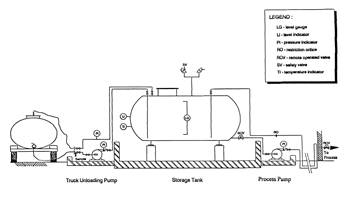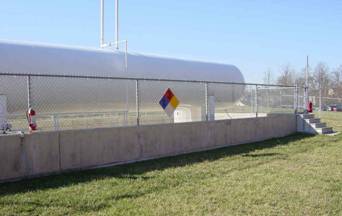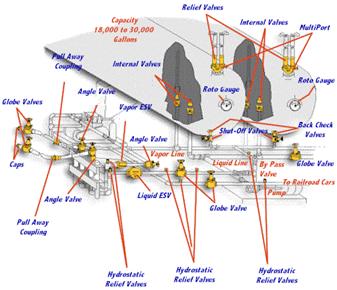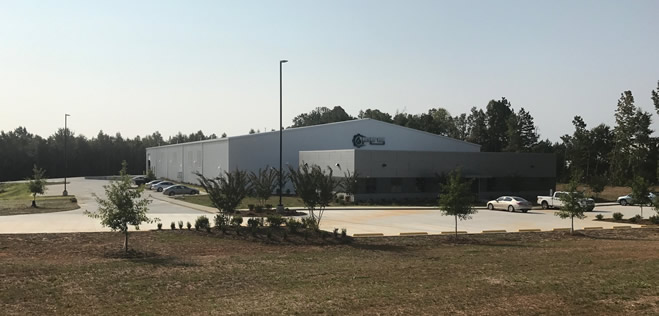Products / Hydrocarbon Bulk Storage Systems
Pentane & Butane Blowing Agent Storage Systems:
What is a blowing agent?
A blowing agent is a chemical that has certain properties that allow it to quickly vaporize under normal ambient pressure conditions. This ability allows for the chemical to be mixed (under pressure) with polymers to form foams when injected, sprayed or poured onto surfaces or molds that are exposed to ambient pressures. The blowing agent quickly vaporizes, causing the polymer to foam (much like dough rising while being cooked) and then harden in place.
Typical applications include spray foams, foam insulation, foam matting …. Etc.
Why use Pentane or Butane?
While Pentane and Butane have been around a long time, they haven’t always been the first choice for commercial & industrial foaming applications. In the past, HCFC-141b was the primary chemical used as the blowing agent.
However, as of December 2002, HCFC-141b will not be allowed as a blowing agent for most foam applications. This is due to the U.S. Government’s compliance with the MontrealProtocol, in which the accepting countries agreed to ban the use of this family of ozone depleting chemicals.
Therefore, some sort of replacement chemical (blowing agents) are needed. Pentane, Propane and Butane (or combinations) can sometimes fit the bill, depending on your specific applications.
What is so special about a Pentane or Butane storage system?
Most hydrocarbons are EPA regulated chemicals and are considered hazardous materials. To compound the problems, they are also flammable and require specially designed storage and piping systems. In essence, the systems are considerably more complex than a typical bulk storage tank.
Some of the key components in this type of system are:
ASME code stamped Storage Tanks:
(used to store the bulk liquefied hydrocarbons)
Concrete Dike and Leak Detection System:
(EPA regulated double containment)
Specialized Pumps for Thin Hydrocarbon Service: (custom designed for each application)

Standard Detail for a Pentane Storage System
Why use a bulk storage system?
Most chemical manufacturers give significant discounts if they can ship the product to you in transport truck quantities (typically 8000+ gallons per truck). This would necessitate a tank with approximately 150% of the truck capacity, in this particular case a 12,000 gallon tank. There are also even larger discounts on pricing when a customer can take the product by the rail-car load (typically 25,000 gallons at a time, usually into a 30,000 gallon storage tank near the customer’s rail stop).

12,000 Gallon Pentane Storage Tank in Charlotte, NC
Propane-Air Standby Systems:
What is a propane-air standby system?
A propane-air standby system, as offered to industrial and utility natural gas users, is a system that is an alternative source of energy. It is activated in the event a natural gas source is curtailed or shut off completely. Some facilities use oil as a standby system, but oil is not a direct replacement for natural gas because oil requires separate burners, controls and piping. Propane is an ideal standby fuel for natural gas. When mixed with air, propane duplicates the burning characteristics of natural gas, allowing the use of existing burners, controls and piping.
Some of the key components in this type of system are:
Propane Storage Tanks:
(used to store the bulk liquified propane)
Vaporizer:
(used to convert liquid propane to a gas)
Mixer/Blender: (used to accurately mix the vaporized propane with air)

Standard Detail for a Propane-Air Standby System
Why use a propane-air standby system?
First, a standby system is insurance against any interruption of natural gas supply. Second, a standby system allows industries to take advantage of interruptible rates for gas usage. Many industrial gas consumers are not aware that natural gas contracts that gas companies have are for specific amounts of natural gas for specific lengths of time. These contracts are for residential and industrial customers alike, but when residential users consume more gas than anticipated during unusually long or severe cold periods, industrial users can have their service interrupted. A gas flow interruption can be very costly to industries in terms of damage to equipment, loss of production and even plant shutdowns. Natural gas companies, therefore, encourage the installation of a standby system in the event natural gas service is interrupted. Winter raises the probability of such interruptions, and as an incentive, most gas companies offer an interruptible rate to those with standby systems. This rate is effective throughout the year and is usually significantly lower than the standard non-interruptable rate. With a standby system in place, industries may take in stride the 2-hour notice gas companies customarily give prior to an interruption, and simply switch over to their propane standby system. Given the lower interruptible rate, some plants may amortize a propane-air standby system cost in less than two years.
What is a peak load shaving plant?
A peak load shaving plant is a term used by gas companies to define a facility using a gas blending program. Gas companies’ best planned quotas for gas usage cannot allow for unexpected cold spells or broken gas lines. Therefore, to supplement contracted-for gas, gas utilities will use a propane-air mix to duplicate the BTU content of natural gas. This permits a more consistent customer fuel rate and allows utilities to meet peak demand loads.














